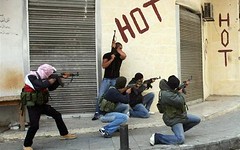Clashes in Beirut
May 11th, 2008 by MESH
From Philip Carl Salzman
 After modest initiatives in recent days by the Lebanese government to restrict the independent operations of Hezbollah, fighters of Hezbollah and Amal flooded into the streets of west Beirut, attacked and dispersed government fighters, set up road blocks, and occupied government and media offices. The Druze and Christian militias did not act, and the Sunni militia limited itself to minor engagement. The Lebanese Army remained on the sidelines, respecting “neutrality.”
After modest initiatives in recent days by the Lebanese government to restrict the independent operations of Hezbollah, fighters of Hezbollah and Amal flooded into the streets of west Beirut, attacked and dispersed government fighters, set up road blocks, and occupied government and media offices. The Druze and Christian militias did not act, and the Sunni militia limited itself to minor engagement. The Lebanese Army remained on the sidelines, respecting “neutrality.”
On May 8, Hezbollah Secretary-General Hasan Nasrallah gave a speech in which he said: “…whoever declares, and starts, war against us, be it a mother, a father, or a brother—we have a right to counter him and defend our rights, our weapons, our existence, and our resistance.” The other militias take the same view. The overall pattern is a set of quasi- or fully independent political corporations, based on identity and fierce loyalty, each armed and maintaining the right to act militarily in its own interests and those of its constituents. Each political corporation seeks dominance over the others, or, if that is not possible, a balance in which its interests and those of its constituents are not violated by the others. “National” institutions are weak, undermined by partisan loyalties and the independent corporations. Consequently, there is no overarching, inclusive loyalty, no rule of law, and no peaceful procedures for resolving basic conflicts.
How can we understand this factional pattern of institutionalized fragmentation and oppositional conflict? My suggestion is that this pattern reflects the “tribal spirit” of Arab culture, manifested in self-help corporations for defense and the advancement of interests, and for which men have a primarily obligation to engage in military action. Each man has a duty to be a warrior, and most take pleasure in the glory of it. In the view of the members of a corporation, there is no presumption of rights for members of other corporations, and there is no recognition of legitimate authority outside of the corporations and above them.
In Lebanon, of course, these corporations are primarily defined by sect—Sunni, Shi’a, Christian, Druze—as are some of the corporations found in Iraq, such as Sadr’s “Mahdi Army” Shiite militia, while others are ethnic, such as the Kurdish Peshmerga. These sect- and ethnicity-defined corporation-militias are often found in Arab cities—Beirut, Bagdad, and Basra are those most recently in the news—but descent-based corporations, actual tribes, are prevalent in rural trouble spots, such as Anbar Province of Iraq, throughout Afghanistan, in the mountains and deserts of Pakistan, and in currently quiescent places, such as Libya, in both town and country. The sect-based corporations have inherited presumptions and structures from the descent-based tribes, applying them in corporations based upon a different principle of identity: religion rather than descent. The same, of course, applies to Islam in general, in its militant opposition of the dar al-Islam to the dar al-harb.
Politically stable countries in the Arab world, such as Iraq under Saddam and Syria under the Alawites, demonstrate the factional opposition at a different phase, one in which one corporation has succeeded in establishing dominance over the others, using the state as a weapon to suppress any opposition. As we have seen in Iraq, remove the successful oppressor, and factional opposition ignites with fury. All of which is highly reminiscent of the tribal wars throughout Middle Eastern and North African history.
 Posts+Comments
Posts+Comments Posts+Comments
Posts+Comments Posts+Comments
Posts+Comments Posts+Comments
Posts+Comments